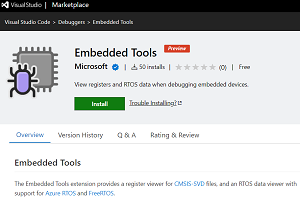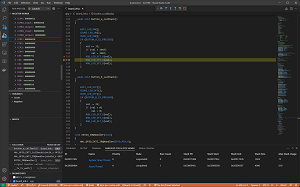News
Microsoft Takes VS 2022 Embedded Tools (C++) to VS Code
Microsoft's C++ dev team announced that an Embedded Tools extension introduced to Visual Studio 2022 last year is now available for Visual Studio Code as a preview.
The Embedded Tools extension now has 50 installs after being introduced yesterday (March 9), with the VS Code Marketplace description saying it lets developers view registers and Real-Time Operating System (RTOS) data when debugging embedded devices. Specifically, it provides a register viewer for CMSIS-SVD files, along with an RTOS data viewer with support for Azure RTOS and FreeRTOS.
 [Click on image for larger view.] The Embedded Tools Extension (source: Microsoft).
[Click on image for larger view.] The Embedded Tools Extension (source: Microsoft).
The same functionality was injected into a VS 2022 preview last December, when Microsoft explained that the extension is used in conjunction with new vcpkg artifact capabilities to quickly bootstrap an embedded development machine and get started with actual coding. Those capabilities center around vcpkg, Microsoft's cross-platform open source package manager.
Microsoft defines an artifact as a set of packages required for a working development environment, listing compilers, linkers, debuggers, build systems and platform SDKs as examples of relevant packages.
 [Click on image for larger view.] The Example Azure RTOS ThreadX Project (source: Microsoft).
[Click on image for larger view.] The Example Azure RTOS ThreadX Project (source: Microsoft).
The company's March 10 announcement post explains using vcpkg from a PowerShell prompt to activate an embedded development environment for an example Azure RTOS ThreadX project (pictured above), but any shell can be used. It demonstrates functionality around: code navigation and IntelliSense; building, deploying and debugging on hardware; working with peripheral registers and RTOS object views; and more.
"We hope that these new capabilities will enable you to choose VS Code for your embedded development needs and make you more productive," Microsoft said. "We are very interested in your feedback to continue to improve this experience. The comments below are open, or you can find us on Twitter (@VisualC), or via email at [email protected]."
About the Author
David Ramel is an editor and writer at Converge 360.